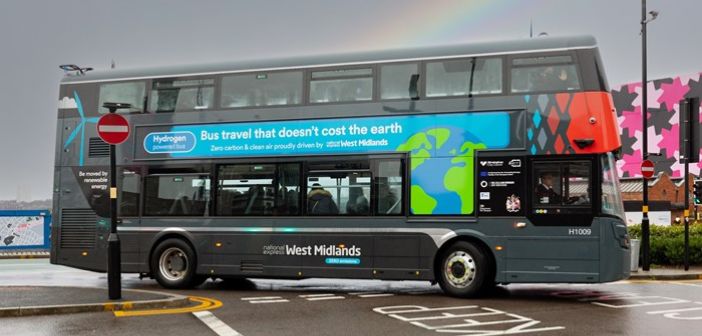A fleet of 124 new environmentally friendly hydrogen fuelled buses will be taking to the streets of the West Midlands following the approval of a £30m Department for Transport grant.
It follows a successful bid to the Zero-emission Bus Regional Areas (ZEBRA) fund to promote cleaner and greener bus transport and will cover the cost of a refuelling facility as well as the new vehicles.
The funding tops up private bus company investment in bus fleets over the next three years to accelerate the switch from diesel buses to clean and green vehicles. Transport for West Midlands (TfWM), which is part of the West Midlands Combined Authority (WMCA), will now work with bus company partners and the hydrogen production industry to get the fleet up and running.
Some 24 of these new vehicles will be articulated tram-style buses set to run on the new Sprint rapid transit routes between Walsall, Birmingham and Solihull.
WMCA said the West Midlands is already leading the way with 20 hydrogen double decker buses, bought by Birmingham City Council and operated by National Express West Midlands. It means the region will have 144 hydrogen buses on the streets – the largest fleet in the Western World.
Last year the region secured £50m DfT funding to create the UK’s first All Electric Bus City in Coventry by 2025 – a project which will also deliver cleaner air and lower carbon footprint and see up to 300 fully electric buses operate across the city.
Pete Bond, director of integrated transport services with TfWM, said: “Buses are the most used form of public transport in the region and this is welcome government investment in our network. These hydrogen buses, the All Electric Bus City scheme in Coventry and the roll out of electric vehicle charging facilities we are planning shows how the West Midlands is leading the way on decarbonising our transport and making good progress on achieving our net-zero targets.
“Not only is it welcome to support our work to improve the air we breathe, but new modern buses, accompanied by the new bus lanes and priority measures being introduced will offer commuters a reliable and comfortable alternative to the car and traffic congestion.”
“It also presents an incredible opportunity to make the West Midlands a world leader in the new hydrogen economy.”





